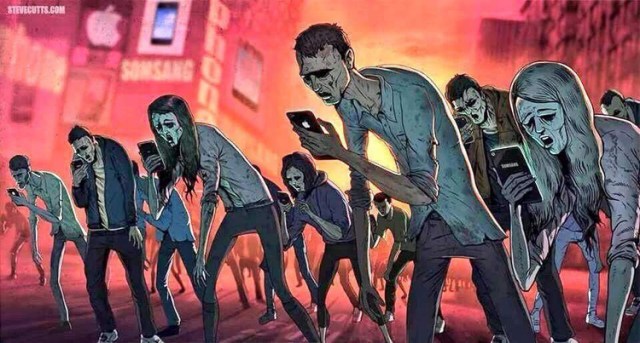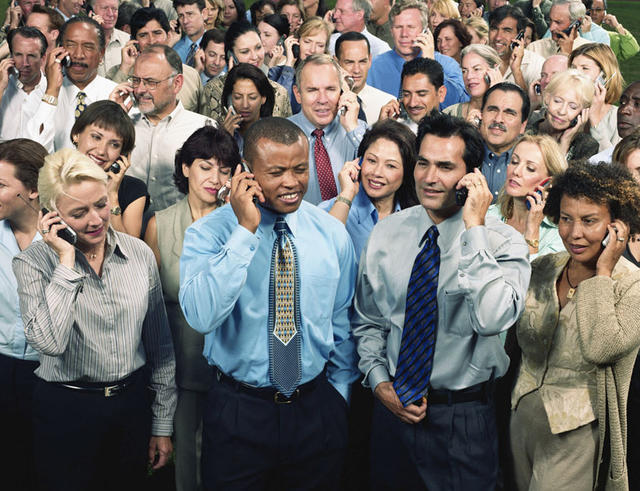We always talk about “what a distraction” cell-phones are in modern society. But what does it mean? How exactly are they a distraction? What is it they affect directly within our anatomical system and physiology that causes that distraction?

- They most certainly affect ongoing peripheral vision. Staring directly down or in front of a centralized tool for either long-term continuous periods or uber-frequently throughout the days slowly starts wearing away at our innate peripheral scanning, negating or restricting our 360-degree, 3-dimensional worldview.
- They blur proximity and distance elements. People, objects, barriers, simultaneously-moving things close distance and invade space without us even noticing. Most times that’s not a life-threatening problem but the odds are most certainly increased that one day it may be.
- They create perceptual and cognitive “lag.” After even short, intense focused-attention on the screen causes momentary lag in cognition and perception of circumstances or unfolding scenarios. Even a second or two of additional processing-need is a huge alteration to how our innate survival system often immediately accesses decision-making heuristics.
- Decreased visual capability limits or decreases the ability to see clearly any potential risks, dangers, threats, or upcoming problems. One of our senses starts gradually deteriorating for stimuli-intake….the visual.
- They will inevitably increase our target-selection attention. Whether by low- or high-order criminal, snakeoil-peddler, MLM-opportunist, or general conflict as a human-pinball machine from some guy having a bad day and wanting to take it out on someone….you simply cannot play gray or exhibit concealment from zombie-posture.

As usual, I like to delve into the whys and hows instead of just throwing the whats and whos out there. As far as solutions and solidified approaches to dealing with the issues presented? There is such a vast, complex web of context present with dynamically-changing circumstance, as always, I don’t do the “one-size-fits-all” thing or give specific cookie-cutter solutions to 3-dimensional problems. Your job, taking an active approach to yours and your incapable loved ones´ personal safety, is to come up with your own personal answers for the unbiased stimulus provided, now having a clear(er) picture on what you face on a daily basis without hyperbole, paranoia, or anxiety. (I don’t do those either)
If you´re bound and determined to be on your phone out in the public-realm, and many have to I realize, there are some protocols and alternate uses one can take to minimize the risk of collision, target-focus, or distraction along the way:
- Stop and be fixed when checking your phone. Resist the temptation to check it while moving or mobile. Take a seat, get-off the main walkway or thoroughfare, lean on a wall on the periphery. If in a car, lock the doors before checking that latest red-alert. “Pull off the proverbial highway” can be taken as a metaphor for any number of movement means.
- Scan. Look up regularly from time-to-time. Do not be engrossed or transfixed by the virtual at the expense of the actual.
- I have found that feigning looking at my cell when I get the distinct sensation someone is following me or I have eyes on me allows me to look in the reflection of the phone or scan the area with camera while faking a selfie are 2 pretty innocuos ways to get a 360-degree vantage-point of the people in my vicinity when out in the public-eye.
- That little flashlight is a pretty effective blinder when needed. It is much brighter than I originally expected and even moreso when the screen is off (flashlight stays on) to not put the spotlight on you or affect your own low-light scanning.
- There have been times when a late-night yard-scan have been needed here. At times I have used the cell placed in different hidden locations set-up with alarm or timer to go-off while I am in another area. While it hasn´t had to expose any humans, it has worked with a number of cats, foxes, and birds.
- People with nefarious means generally don´t like you taking their picture for posterity-sake or taking video of their annoyance. While it may create a confrontation, it will also draw attention to them – attention they generally don´t want. Confrontation is often better than assault.
- Feigning calling someone while glancing over from time-to-time often intimates the impression that their cover is blown and you´re on to them. Let them invent who you could be calling – it´s always good to let a potential bad-actor let his mind swirl and create his own story. No need to give out any information unasked-for.
- If you´re in bad area or concerned about targeting, turn-on your GPS or social-media geo-tagging, though I´ve spoken-out against doing so in regards to home-invasions and for advertising an empty-nest. In these cases, leaving a breadcrumb-trail can be invaluable. Buying something on credit-card while being followed contributes to the same trail, as do making phone-calls.

- I tend to believe, in theory, that fewer people are mugging people for cash outside of the guilty areas (ATMs, outside known cash-only businesses, street-vendors, while entering banks or credit unions). Fewer people are carrying more than pocket-change or momentary-purchase money these days with so much of the banking and economic industry going virtual. Which can be a double-edge sword as anyone following you these days is often desperate or wanting something else entirely…
- Utilizing angles and shapes for one-sided apertures is viable avenue of utilizing the cell´s camera or reflection for gaining the upper-hand in sight or accessibility.
- While there seem to be a lot of safety- or alarm-apps to download these days, some better than others, I generally don´t put much stock in them for the reason that so many are geo-tagged by inner-circle people who have access to your location, position, length-of-time, and hours of your whereabouts. As we´ve discussed – often – it is inner-circle people (family, friends, loved ones, acquaintances, satellites) that often present the greatest threat to our safety, and remember that should those relationships crumble for whatever reason, they have some very pertinent data with which to stalk, track, keep-tabs, or otherwise know some potentially personal information on you and who you´re spending your time with. A legal case from an ex-spouse or partner regarding shared-children or alimony or simple-revenge, a manipulative sibling, a now-inappropriate old friend, fling, lawyer, invasive paternal or maternal figures, etc.
- Listing specifics using voice-recording tech on the phone (Messenger, WhatsApp, Signal all have this) can record any details you know about anyone following you – clothing, distinguishing features, gait, height, weight, facial-features, tattoos, shoes – if a pic isn´t an option or is too direct under the circumstances.

- If you´re attempting concealment or cover, turn your phone´s alerts, volume, light, sound off. Nothing gives away position or reveals location faster than your Dukes of Hazzard phone-ring from Aunt Becky.
- Note again, we can split attention but not focus. If you are partially paying-attention to your phone, you are also partially paying attention to your environment. Always. Nobody is above this unless feigning split-attention. And one doesn´t feign focus. There is focused and unfocused, but there is partially-focused.
- I use my clock-timer pretty heavily. For breath-control, breath-capability, breath-maintenance. Jogging, both aerobic and anaerobic. Timing length-of-time it takes to get from point A-to-point B, both in-traffic and out. How long a particular vehicle or person is following my same trajectory. How long it takes me to get in-and-out of highly-populated places. I like the Waze and Uber apps for the same reasons as it they give specific times factoring in a variety of intangibles like police-stops, upcoming accidents, roadblocks, detours, traffic-jams, etc.
If all these little tactical or strategical tidbits potentially can work for you, as always, assume they also can work for others against you. To know deviousness and trickery is to know that others know deviousness and trickery too. One doesn´t take them for granted and is forced to learn nuances and intricacies of pulling them off in real-time, instead of just paying lip-service to them as an impressive parlour-trick and ego-play.
Keep in mind also that many or most of these create a targeted sentiment which is great for setting the tone if self-defense would actually be needed. It establishes the precedent that you weren´t the aggressor or offensive party but the reactionary one. That breadcrumb-trail and laying-traps creates a body of work that gives far greater freedom for use-of-force should it become necessary. “Plan the aftermath at the commencement.” Remember, “defense” is associated with “bad” or “negative” in the self-defense world but liability, legal, social-acceptability, capability, and rules-of-engagement elements always factor-in AND remember that while offense puts assess in the proverbial seats, defense still wins championships. Don´t knock the mouse role in cat-and-mouse until you´ve tried it or until it´s the most effective and appropriate role for the given circumstance.
AND, if nothing happens and no danger exists, they´re good cognitive and mind-sharpness exercises to keep your brain active and engaged without becoming a Facebook zombie. Your smartphone can be a tool of good if you know how to utilize it properly and creatively.
